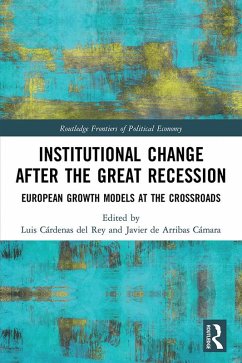Institutional Change after the Great Recession (eBook, ePUB)
European Growth Models at the Crossroads
Redaktion: Cárdenas del Rey, Luis; de Arribas Cámara, Javier
43,95 €
43,95 €
inkl. MwSt.
Sofort per Download lieferbar

22 °P sammeln
43,95 €
Als Download kaufen

43,95 €
inkl. MwSt.
Sofort per Download lieferbar

22 °P sammeln
Jetzt verschenken
Alle Infos zum eBook verschenken
43,95 €
inkl. MwSt.
Sofort per Download lieferbar
Alle Infos zum eBook verschenken

22 °P sammeln
Institutional Change after the Great Recession (eBook, ePUB)
European Growth Models at the Crossroads
Redaktion: Cárdenas del Rey, Luis; de Arribas Cámara, Javier
- Format: ePub
- Merkliste
- Auf die Merkliste
- Bewerten Bewerten
- Teilen
- Produkt teilen
- Produkterinnerung
- Produkterinnerung

Bitte loggen Sie sich zunächst in Ihr Kundenkonto ein oder registrieren Sie sich bei
bücher.de, um das eBook-Abo tolino select nutzen zu können.
Hier können Sie sich einloggen
Hier können Sie sich einloggen
Sie sind bereits eingeloggt. Klicken Sie auf 2. tolino select Abo, um fortzufahren.

Bitte loggen Sie sich zunächst in Ihr Kundenkonto ein oder registrieren Sie sich bei bücher.de, um das eBook-Abo tolino select nutzen zu können.
This book combines demand-led growth models and the institutionalist approach, in order to explain the macroeconomic performance of the main European countries in recent years.
- Geräte: eReader
- mit Kopierschutz
- eBook Hilfe
Andere Kunden interessierten sich auch für
![The Great Market Debate in Soviet Economics: An Anthology (eBook, ePUB) The Great Market Debate in Soviet Economics: An Anthology (eBook, ePUB)]() David M JonesThe Great Market Debate in Soviet Economics: An Anthology (eBook, ePUB)30,95 €
David M JonesThe Great Market Debate in Soviet Economics: An Anthology (eBook, ePUB)30,95 €![Understanding the Great Recession (eBook, ePUB) Understanding the Great Recession (eBook, ePUB)]() Jared M. RagusettUnderstanding the Great Recession (eBook, ePUB)40,95 €
Jared M. RagusettUnderstanding the Great Recession (eBook, ePUB)40,95 €![Welfare and the Great Recession (eBook, ePUB) Welfare and the Great Recession (eBook, ePUB)]() Welfare and the Great Recession (eBook, ePUB)37,95 €
Welfare and the Great Recession (eBook, ePUB)37,95 €![Social Democracy in Capitalist Society (Routledge Revivals) (eBook, ePUB) Social Democracy in Capitalist Society (Routledge Revivals) (eBook, ePUB)]() Richard ScaseSocial Democracy in Capitalist Society (Routledge Revivals) (eBook, ePUB)34,95 €
Richard ScaseSocial Democracy in Capitalist Society (Routledge Revivals) (eBook, ePUB)34,95 €![Profitability and the Great Recession (eBook, ePUB) Profitability and the Great Recession (eBook, ePUB)]() Ascension MejoradoProfitability and the Great Recession (eBook, ePUB)37,95 €
Ascension MejoradoProfitability and the Great Recession (eBook, ePUB)37,95 €![The New Institutional Economics and Third World Development (eBook, ePUB) The New Institutional Economics and Third World Development (eBook, ePUB)]() The New Institutional Economics and Third World Development (eBook, ePUB)63,95 €
The New Institutional Economics and Third World Development (eBook, ePUB)63,95 €![Fiscal Policy and Institutional Renovation in Support of Innovative Country Building (eBook, ePUB) Fiscal Policy and Institutional Renovation in Support of Innovative Country Building (eBook, ePUB)]() Jia KangFiscal Policy and Institutional Renovation in Support of Innovative Country Building (eBook, ePUB)42,95 €
Jia KangFiscal Policy and Institutional Renovation in Support of Innovative Country Building (eBook, ePUB)42,95 €-
-
-
This book combines demand-led growth models and the institutionalist approach, in order to explain the macroeconomic performance of the main European countries in recent years.
Dieser Download kann aus rechtlichen Gründen nur mit Rechnungsadresse in A, B, BG, CY, CZ, D, DK, EW, E, FIN, F, GR, HR, H, IRL, I, LT, L, LR, M, NL, PL, P, R, S, SLO, SK ausgeliefert werden.
Produktdetails
- Produktdetails
- Verlag: Taylor & Francis eBooks
- Seitenzahl: 430
- Erscheinungstermin: 12. August 2021
- Englisch
- ISBN-13: 9781000391336
- Artikelnr.: 62240899
- Verlag: Taylor & Francis eBooks
- Seitenzahl: 430
- Erscheinungstermin: 12. August 2021
- Englisch
- ISBN-13: 9781000391336
- Artikelnr.: 62240899
- Herstellerkennzeichnung Die Herstellerinformationen sind derzeit nicht verfügbar.
Luis Cárdenas holds a PhD in Economics from the Complutense University of Madrid. He is also an associate researcher at the Complutense Institute for International Studies (ICEI) and is Associate Professor of Macroeconomics at the Universidad Complutense. He has been also a visiting researcher at the National Autonomous University of Mexico (UNAM). His research has been focused on macroeconomic analysis and labor economics, and it has been published in articles in Structural Change and Economic Dynamics, Cambridge Journal of Economics, British Journal of Industrial Relations, International Labour Review, Review of Keynesian Economics, Spanish Journal of Economics and Finance, among others. Javier Arribas currently works as Associate Lecturer at the Complutense University of Madrid and at the Rey Juan Carlos University. He holds a Ph. D. in Economics at the Universidad Complutense, Madrid. The Ph. D. was funded by a doctoral research fellowship granted by the Madrid City Hall. He has been Visiting Lecturer and Visiting researcher in Quito (Ecuador) or Mar del Plata (Argentina). His research has been focused on public services, institutional economy and History of economic thought. His research line includes publications in Journal of Economic Issues or Ola Financiera.
1. Introduction
2. Foundations of a growth model perspective
1. Institutional reform and changes in the economic governance of the
European Union after the economic crisis
2. France: low inequality despite poor economic performance. Analyzing
the role of workers protection institutions in a debt-financed
consumption-led model
3. The mechanics of German capitalism: dualism and inequality in an
export-led economy
4. The impact of the institutional change on the economic growth path in
Greece
5. Italy and the Global Financial Crisis: The Fallacy of Debt-led Growth
through Moderation, Austerity, and Populism
6. In the Eye of the Storm: the "success" of the Spanish growth model
7. This Time was Different. The Crisis that Went Past Sweden
8. Financial services industry power and labour market polarization in
the UK debt-led growth model
9. Financial and economic crisis within the EU: consequences for the
Polish banking institutional system
10. Conclusions
2. Foundations of a growth model perspective
1. Institutional reform and changes in the economic governance of the
European Union after the economic crisis
2. France: low inequality despite poor economic performance. Analyzing
the role of workers protection institutions in a debt-financed
consumption-led model
3. The mechanics of German capitalism: dualism and inequality in an
export-led economy
4. The impact of the institutional change on the economic growth path in
Greece
5. Italy and the Global Financial Crisis: The Fallacy of Debt-led Growth
through Moderation, Austerity, and Populism
6. In the Eye of the Storm: the "success" of the Spanish growth model
7. This Time was Different. The Crisis that Went Past Sweden
8. Financial services industry power and labour market polarization in
the UK debt-led growth model
9. Financial and economic crisis within the EU: consequences for the
Polish banking institutional system
10. Conclusions
1. Introduction
2. Foundations of a growth model perspective
1. Institutional reform and changes in the economic governance of the
European Union after the economic crisis
2. France: low inequality despite poor economic performance. Analyzing
the role of workers protection institutions in a debt-financed
consumption-led model
3. The mechanics of German capitalism: dualism and inequality in an
export-led economy
4. The impact of the institutional change on the economic growth path in
Greece
5. Italy and the Global Financial Crisis: The Fallacy of Debt-led Growth
through Moderation, Austerity, and Populism
6. In the Eye of the Storm: the "success" of the Spanish growth model
7. This Time was Different. The Crisis that Went Past Sweden
8. Financial services industry power and labour market polarization in
the UK debt-led growth model
9. Financial and economic crisis within the EU: consequences for the
Polish banking institutional system
10. Conclusions
2. Foundations of a growth model perspective
1. Institutional reform and changes in the economic governance of the
European Union after the economic crisis
2. France: low inequality despite poor economic performance. Analyzing
the role of workers protection institutions in a debt-financed
consumption-led model
3. The mechanics of German capitalism: dualism and inequality in an
export-led economy
4. The impact of the institutional change on the economic growth path in
Greece
5. Italy and the Global Financial Crisis: The Fallacy of Debt-led Growth
through Moderation, Austerity, and Populism
6. In the Eye of the Storm: the "success" of the Spanish growth model
7. This Time was Different. The Crisis that Went Past Sweden
8. Financial services industry power and labour market polarization in
the UK debt-led growth model
9. Financial and economic crisis within the EU: consequences for the
Polish banking institutional system
10. Conclusions







